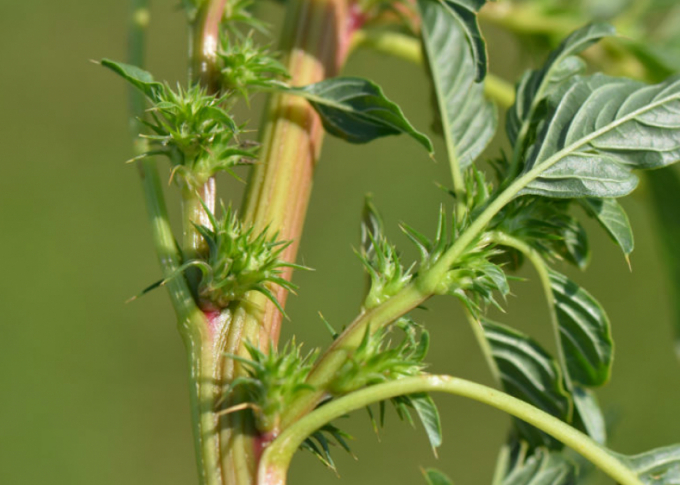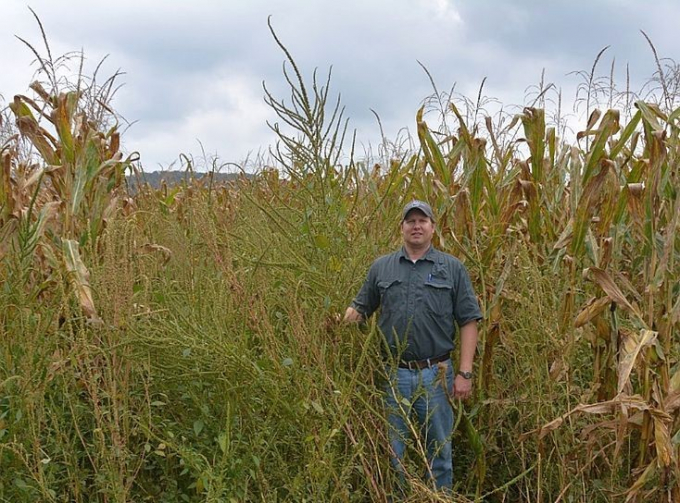November 25, 2025 | 09:40 GMT +7
November 25, 2025 | 09:40 GMT +7
Hotline: 0913.378.918
November 25, 2025 | 09:40 GMT +7
Hotline: 0913.378.918

Palmer amaranth (pigweed)
(Jeff Gunsolus, retired University of Minnesota Extension weed scientist.)
Bayer Crop Science expects to soon address both weeds with an active ingredient, diflufenican, that targets a site of action in plants that differs from herbicides U.S. growers commonly use, says Frank Rittemann, Bayer product manager for corn, soybeans and cotton.
The company will market the product under the brand name Convintro. Pending approval by the U.S. Environmental Protection Agency, the company expects to introduce Convintro for farmer use as early as 2023.
How it works
Diflufenican has a bleaching action, inhibiting carotenoid biosynthesis in plants which results in their death, according to UK-based AgChem Access crop protection company. Carotenoids are necessary for the plant to gather light for photosynthesis.
Ritteman says the global Herbicide Resistance Action Committee has classified diflufenican as a Group 12 molecule, a member of the chemical family of Phenyl ethers.
While the herbicide has been used in Europe for a number of years, primarily for broadleaf weed control in cereals, it’s a relatively unknown for U.S. row-crop producers.
“This is a first for North America, in that diflufenican specifically targets Palmer amaranth and waterhemp in corn and soybeans,” Ritteman says. “Those are its strong suit here, its forte.”
He adds that the herbicide has limited action on other weed species common in corn and soybeans.
In 2017 the Weed Science Society of America (WSSA) voted Palmer amaranth the “most troublesome weed” in the U.S., because it is so competitive with row crops for nutrients, moisture and sunlight and can quickly develop resistance to herbicides. It has evolved resistance to at least five different herbicide sites of action.
Researchers confirmed in 2018 that some waterhemp populations have evolved resistance to six herbicide modes of action. Waterhemp is more adaptable than Palmer amaranth when it comes to conferring multiple resistances, but Palmer is the more aggressive-growing weed.
Ritteman says he is unsure why Bayer did not discover diflufenican’s ability to control pigweed and waterhemp sooner. However, it is a routine practice for companies to test and retest their available molecules of which there are often hundred and even thousands, on various weed species to assess their activity on them.
Multiple active ingredients

Dwight Lingenfelter, weed science extension associate in the College of Agricultural Sciences, stands next to a Palmer amaranth plant in a corn field. The weed can grow to as high as 8 feet. IMAGE: PENN STATE
To broaden the weed spectrum Convintro will be able to address in soybeans, Ritteman says Bayer plans to package diflufenican with two additional active ingredients, metribuzin (Sencor) and flufenacet.
Metribuzin is classified by the WSSA as a Group 5 active ingredient and works as a photosynthesis inhibitor. Flufenacet is a Group 15 active ingredient and is a long-chain fatty acid inhibitor.
Soybean growers will be able to apply Convintro as a burndown or preemergence product. It does offer some residual control, allowing the crop to emerge and begin growth minus weed competition. However, the company will position the product as part of a comprehensive weed-control program, encouraging the use of multiple technologies and agronomic practices to prevent weed growth, especially resistant weeds.
In corn, diflufenican will be paired with an HPPD inhibitor to boost its weed control capabilities, Ritteman says.
(AgWeb)

(VAN) Brazil's COP30 presidency pushed through a compromise climate deal on Saturday that would boost finance for poor nations coping with global warming but that omitted any mention of the fossil fuels driving it.

(VAN) Poultry farmers in the UK have been warned that they could face one of the worst winters yet for bird flu.

(VAN) Prices of main-crop paddy have risen sharply, with jasmine rice hitting 16,100 baht per tonne — the highest level in years.

(VAN) In Brazil, FAO unveiled a series of reports and initiatives showing how sustainable agrifood systems are a solution to the climate crisis.

(VAN) With names like neodymium and dysprosium, rare-earth elements sound exotic — and their perceived scarcity has only added to the mystique.

(VAN) In a new study published in Trends in Biotechnology, researchers used a gene-editing technology called CRISPR to increase a fungus's production efficiency and cut its production-related environmental impact by as much as 61%- all without adding any foreign DNA.

(VAN) A top official in Beijing’s Cop delegation says China is committed to clean energy – but US’s absence is a problem.